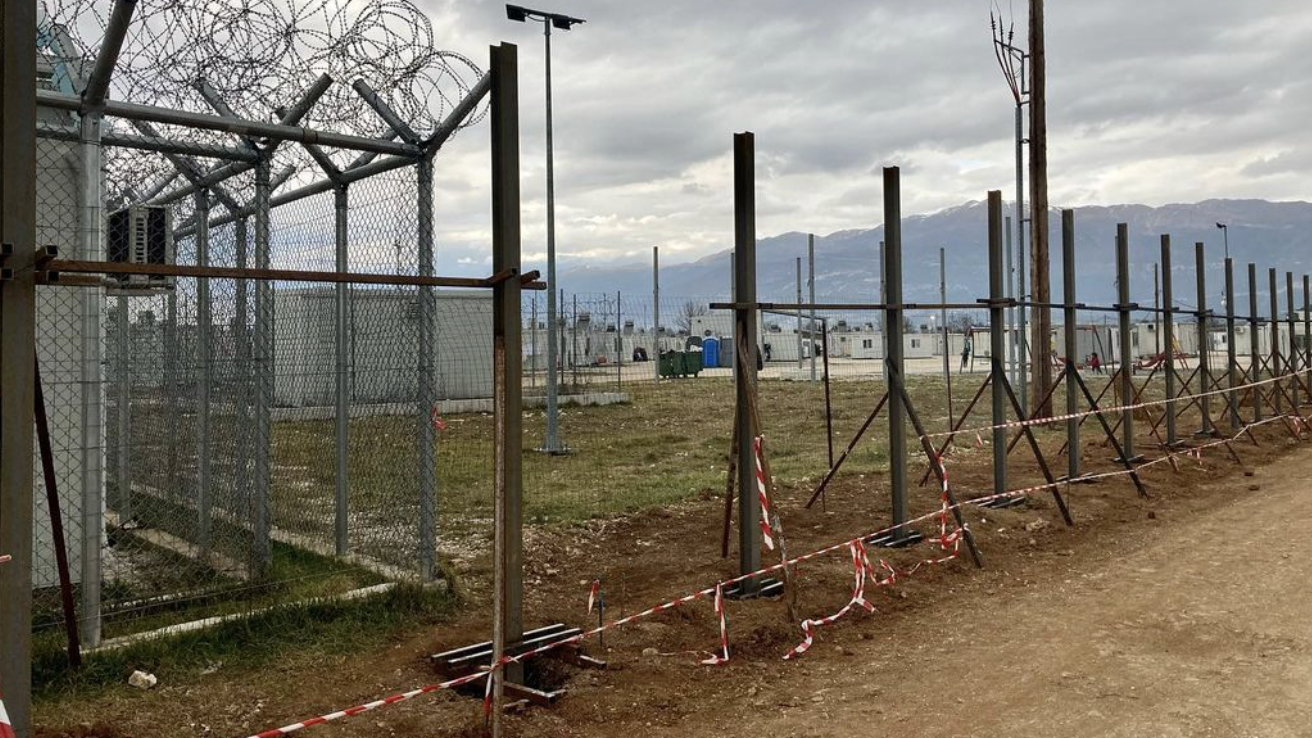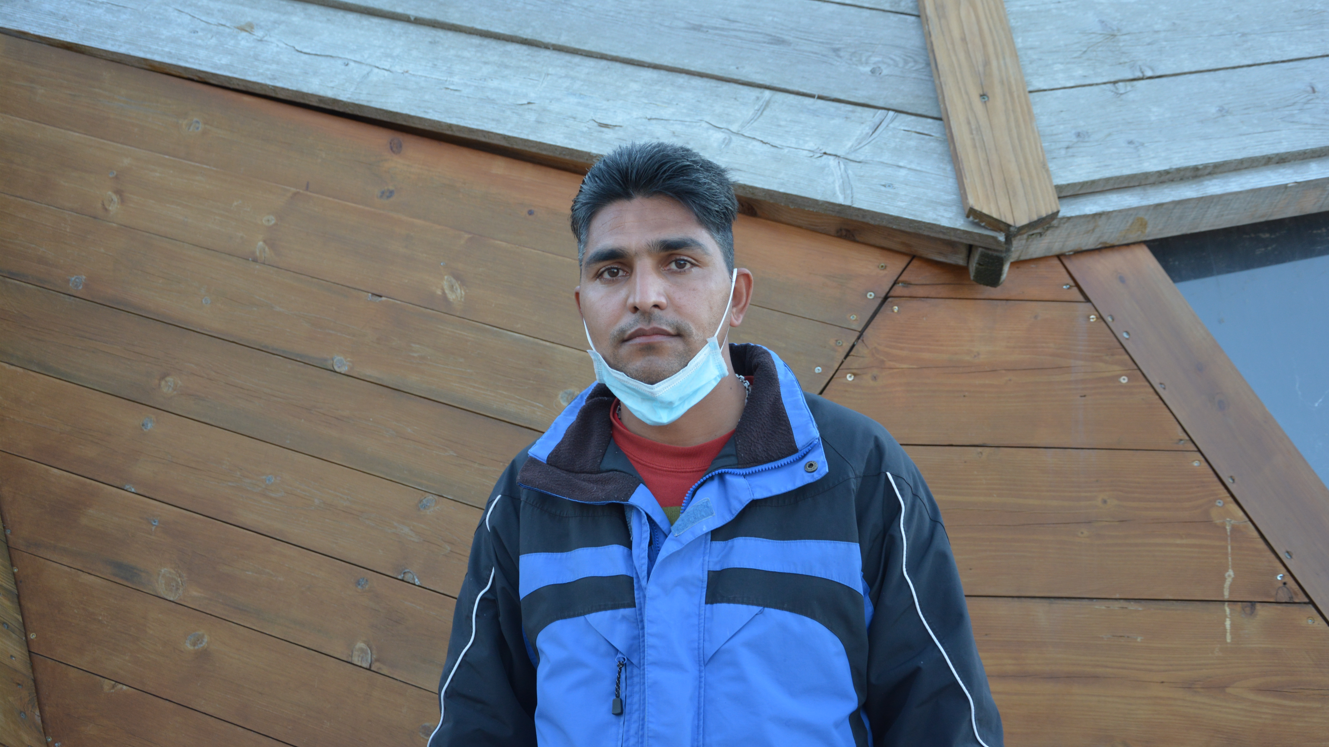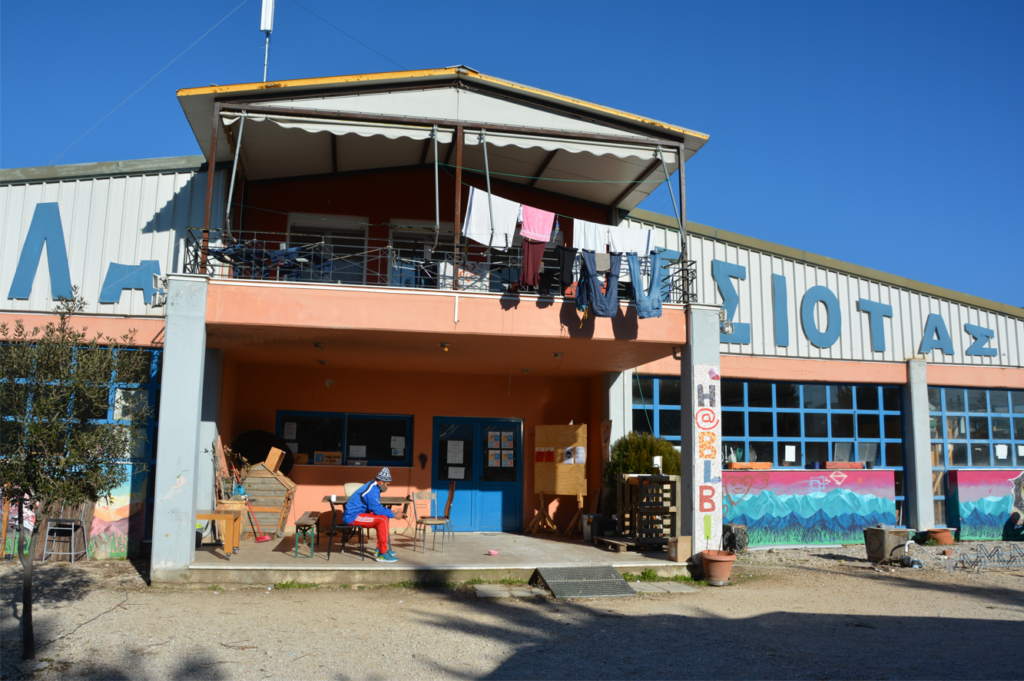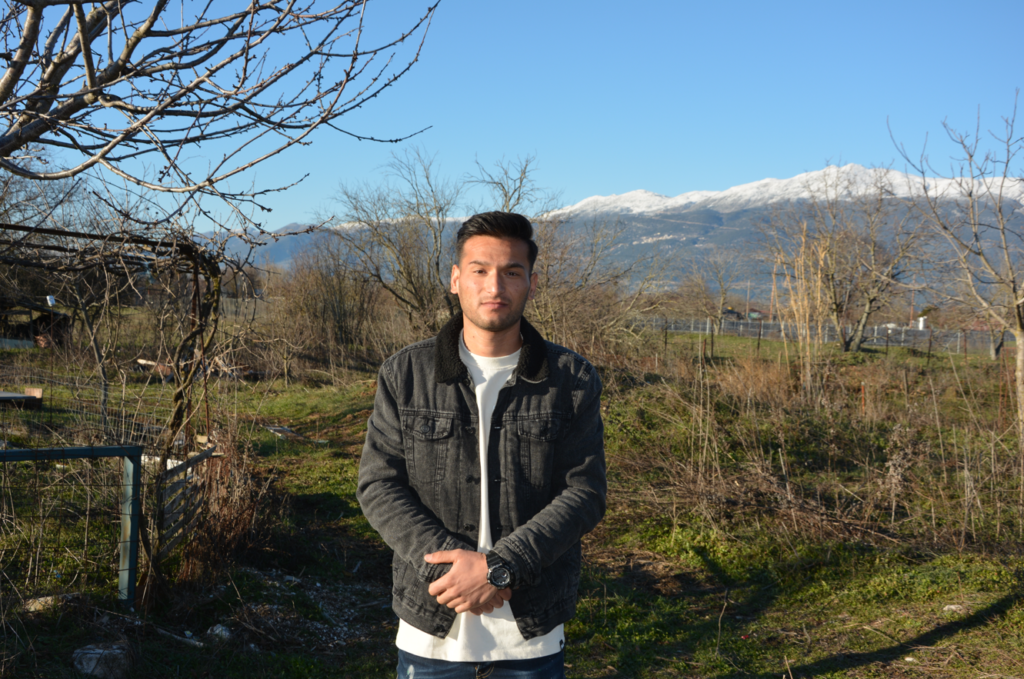
As walls are being built at refugee camps all over Greece, the people who have to live in them are asking not to be made into prisoners, and to be allowed to be part of their local communities.
Men and women at Katsikas camp, Ioannina, have seen the materials for a three-metre-high iron and concrete wall, which will be built around their shelters in the coming days. They report that they have been told they will be placed under a curfew, have been given no reason why the wall and curfew are being imposed on them, and expressed fear, sadness and opposition to the measure.
Camila Eshar is a 39-year-old mother of four, who has been at Katsikas camp since July 2021. She said: ‘Today, they brought a lot of iron for the wall.
‘We are very scared because after that we won’t be able to see outside of the camp, and we will need permission to go outside at all. Why would they want to? With a wall they can make us write down when we want to go outside, and stop us if they want to. And they can check us when we come back in.
‘Nobody who does not live here will be allowed inside. We won’t be allowed visitors. It’s very bad. It’s like a jail. We are all so sad and afraid.’
At Katsikas, unlike at other camps in Northern and Central Greece, the camp commander Dimitris Lakkas has also announced, through his staff, plans for surveillance of each man, women and child in the camp, and a curfew which would last from 7pm and 7am every day, during which time no-one would be allowed to enter or leave. It is far from clear whether such a curfew is even legal.
Ms Eshar said: ‘The camp management told us about cameras they will put up in the camp. Also, they said that after the wall, we can’t go outside from 7pm to 7am.
‘We will have to ask permission to go outside, and we won’t even be able to see outside the camp. I really worry about it. A wall is a wall. We can’t see and can’t go outside. Nobody has told us why they are building a wall, just said it was a government plan.’

Abdullahad Razeqi, 33, is a tiler and father of two. He, his wife and his two sons (now nine and five years old) fled Kabul, Afghanistan, in 2018, and arrived in Katsikas on 19 February 2021, having first been at Moria and then in Grevena.
He said: ‘The wall is very bad, no good at all. We are not criminals and we should not be in prison. Why are we being shut inside walls? We didn’t commit any crimes. We escaped from crimes being committed in our countries. But this is being done to us.
‘I feel lost about the wall. So unhappy. Why are they shutting us in, shutting us away from the Greek people? What have we done? We want to be part of the community. Why are they building a wall? We don’t want it, and it’s not for us. So, is it for Greek people? How does it help them?’
The wall at Katsikas is the latest in a series of three-metre-high concrete and iron walls erected at camps all over mainland Greece. They will cost at least €28.4m in total (the amount of EU funding the Greek government is using to build them) for 26 mainland camps: more than €1.09 million per wall.
At Diavata camp, just outside Thessaloniki, a wall was built in late May.
At the time, despite protest from the people living at the camp, a spokesman from the Ministry of Migration, Giannis Kabourakis said the wall – as well as electronic entry and exit cards (which are expected to be installed in Diavata in March) – would: ‘strengthen the sense of security for all involved, both local communities and camp residents,’ though he did not explain what security risk either community faced. He added: ‘No one will be able to enter or leave.’
A source at the camp, speaking in the last week of January 2022, said there were some security issues inside the camp in 2018, but they felt a wall was not the right response, and that the same situation had not occurred – and was unlikely ever to occur – at Katsikas.
They said: ‘The camp was very overcrowded in 2018 and this did lead to some problems. People were denied services and as a result some were effectively forced to beg from other refugees and others became angry. The government had to find people places to stay and it just wasn’t done. You can’t just leave people with no help and then blame them because they are acting in ways people don’t want: if you push people into a corner they will react, and the wall is not the solution to that.
‘I don’t agree with it. I would prefer to see the wall as protection. This does not apply in Ioannina either, as people have not been arriving there in those numbers.’
“Why are they shutting us in, shutting us away from the Greek people? What have we done? We want to be part of the community. Why are they building a wall? We don’t want it, and it’s not for us. So, is it for Greek people? How does it help them?”
Abdulahad Razeqi about the construction of walls around the camp of Katsikas.
Jamila Behnaz is an Iranian who fled her home country with her husband and two daughters after being ‘sentenced’ (told in public) to death for campaigning against the abuse of women, children and men who disagreed with its government. She has lived in Diavata since September 2020, and said: ‘Now the walls are here, I am worried that they will close the camp. A closed camp is like a prison, and this feels more like a prison each day. We don’t mind it as it is, but we don’t want to be prisoners.
‘I am running from one country where it was hard to do everything, and it was like the government made us all prisoners, and it mustn’t happen here. It’s what we ran from. We are not criminals. We did nothing wrong and we do not harm anyone. We do not want to be in prison. When they close a camp, we will feel depressed. Too much control, and having freedom taken away, this is a very bad thing.
‘It is so easy now for them to shut us in, to say ‘you can’t go to the shops in Thessaloniki, or to other places, because we won’t let you.’ This worries us. It would worry you, or anyone. It’s not OK. It feels every day like the camp is more closed. They put night security guards in. The gates are always more closed. It does not make me feel secure. It makes me feel locked in, worried that one day I won’t be allowed to go out of the camp. It is not a good feeling, a bad way to live.’
Sayran Turukenesab, 38, arrived from Iranian Kurdistan to Diavata in June 2018. She said: ‘Before the wall, there were spaces where people could sit outside, meet friends, and see what was around them, where they lived. But then they built the wall, and it is like we are in a jail. ‘No-one comes in, and anyone who tries – even us – has to give all their details. But we live here. We should not have to pass a test every time. They talk about security and of course it is good to be secure, and there were a lot of single men here. Now, there are fewer. ‘But this is a camp. It is a bad place. The wall has not made it better. Really, it has not made the camp worse. But it has made it worse to live in, because it feels like a jail. We did not commit a crime, so we should not feel like we are in a jail.’

Back at Katsikas, Mimi Hapig, co-founder of Habibi.Works, a maker-space over the road from the camp and open to refugees and Greek people, said: ‘It’s absurd that camps exist at all. This is such a rich place in the world, with so many empty buildings. The camps themselves are a measure of control. People should not be living in camps, in containers. The camps should not be there. ‘The walls are also a very symbolic step. Instead of investing money in lives, it’s in walls. It’s sending a message that people are not welcome here. ‘This is EU money the Greek government is spending. It should be spent on education, language learning, very simple things to allow people to become contributing members of our European society. But we are heading in the complete opposite direction.
‘Putting people into a camp allows a wall to be built around the camp, around them. The wall allows a curfew to be imposed. Each measure is a stepping stone to the next.
‘We should be spending the money on necessary, useful things which will benefit everyone in Greece, people seeking asylum, refugees, and people born in Greece. Greek language classes for new arrivals in the city are an obvious first step. They have not been provided at Katsikas for years and years.’
The cost of the walls at the 26 camps on the Greek mainland, €28.4m, is equivalent to €1,632.94 per person living in the camps in mainland Greece (the population is 17,392 people), and could instead pay the average wage of 1,352 teachers, 1,007 nurses, or 1,655 builders, for a year.
There are 500,000 empty properties in Greece. The Greek government could still use the money spent on these walls to instead pay for the refurbishment of every single one of those empty buildings, creating employment, wages and places for every refugee and homeless Greek person in Greece, to live.
Instead, at Katsikas, just as has already happened at Diavata and many other places, men, women and children are left to watch in fear as their perceived imprisonment takes on a physical form.
“Putting people into a camp allows a wall to be built around the camp, around them. The wall allows a curfew to be imposed. Each measure is a stepping stone to the next.”
Mimi Hapig, Co-Founder of Habibi.Works about the construction of walls around the camps.

Zainoullah Daudzai, 22, was born in Afghanistan but grew up in Iran. He fled the country in 2018 and arrived in Ioannina in 2020. He said: ‘The problems with the wall, are… We already are feeling more and more trapped, and this is a physical confirmation. We can’t have friends to visit, and this will make that even more certain. We already can’t really afford to leave the camp, and now the wall will mean we can’t even see outside. We don’t understand why there would be a wall.
‘When the camp manager said they wanted a wall, it depressed everyone. It still depresses us all. They remove our hope. That we could live here and be a part of the wider community. We are being hidden and trapped. What will people think of us? If they cannot even see us? It will make them worry. And there is no need to worry. We are normal people like them, like everyone.
‘It’s like a jail.’
